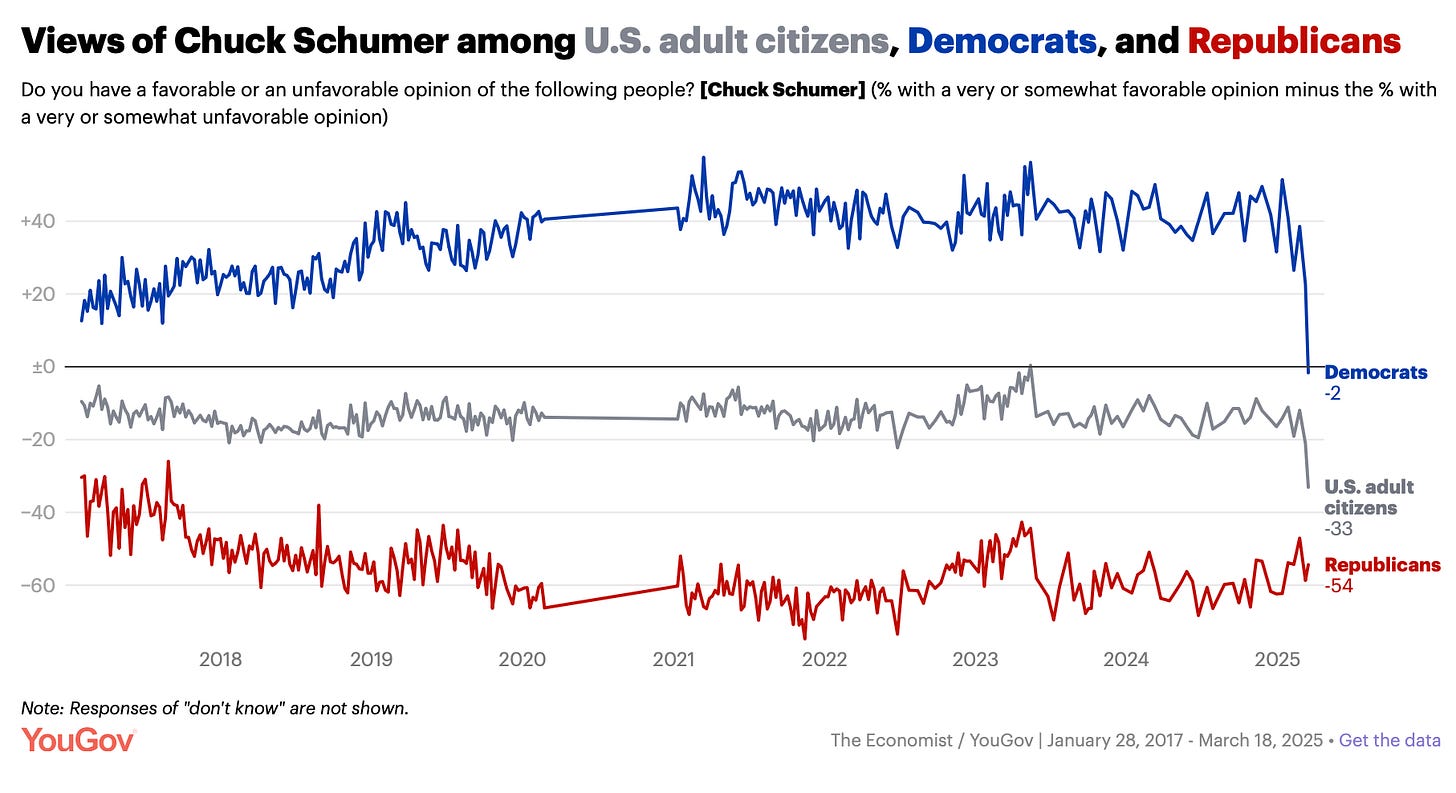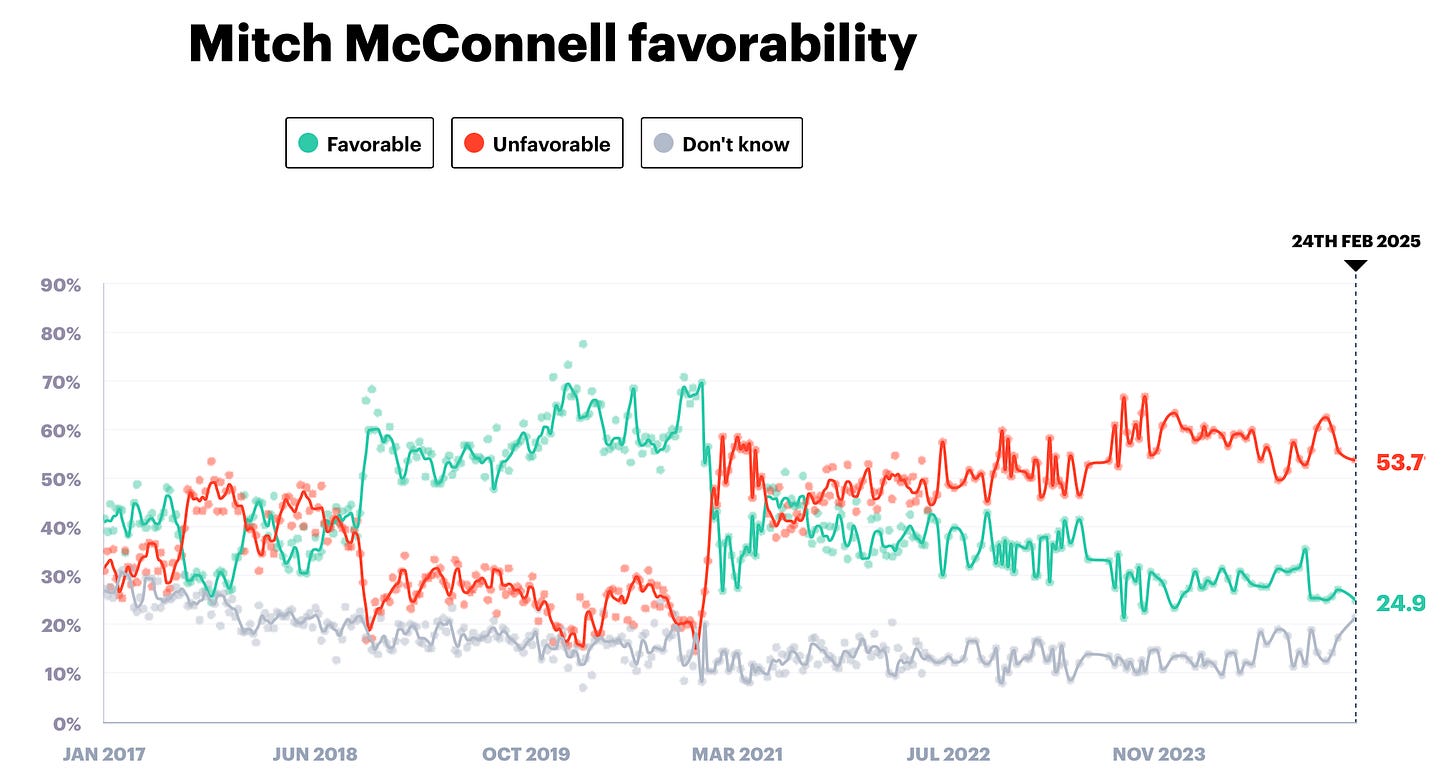Chuck Schumer’s Two Paths
Is he a Biden or a McConnell?
Chuck Schumer’s controversial decision to avert a government shutdown is starting to leave a mark in polls.
Take a look at the absolute nosedive his favorability his taken among Democrats, courtesy of YouGov:
Wow. I haven’t seen a political party sour on a leader so quickly since, well, Republicans turned on Ukrainian president Volodymyr Zelensky after his Oval Office meeting with President Trump:
But back to Schumer. As recently as late February, Schumer’s favorability rating among Democrats stood at 57% per YouGov; it’s now dropped down to 39%. Even more remarkably, in less than a month, his unfavorability rating among his party has catapulted from 18% to 41%.
If you put it all together: that means last month, his net favorability among Democrats stood at +39. Now, it’s -2, a stunning drop that clearly stems almost exclusively from frustration around his decision not to filibuster the Republican-drafted government funding bill.
What does this mean for Schumer going forward? The way I see it, there are two potential paths:
The Biden Path: A top Democrat disappoints his party members in a high-profile incident, leading to Democratic lawmakers — led by Nancy Pelosi — calling for his ouster, ultimately successfully.
The McConnell Path: A congressional leader takes a vote out of step with his party base, fueling long-simmering dissatisfaction from the party. He hangs on for several years, and eventually is able to leave on his own terms (although perhaps earlier than he would have liked).
At this juncture, it seems more likely that Schumer is McConnell’ing than Biden’ing. There have been a few House Democrats who have called for his ouster, but really only a few: the only two have been Rep. Glenn Ivey (D-MD), who said at a town hall that it “may be time for Senate Democrats to choose a new leader,” and Rep. Delia Ramirez (D-IL), who nodded her head and said “yes” when asked by a constituent if Schumer should step down.
Now, when they happen, these things tend to start slow and pick up steam over time — and the House and Senate are currently on recess, so expect a lot more Democrats to face questions on this when they return — but, at a first glance, that doesn’t quite seem like the groundswell that would be required to oust a Senate leader.
Former House speaker Nancy Pelosi — who, of course, played a key role in the Biden putsch — took a jab at her onetime Senate counterpart this week: “I myself don’t give away anything for nothing. I think that’s what happened the other day.” But she also made clear that she still supports Schumer, as did her successor Hakeem Jeffries, who (quite conspicuously) had initially declined to say he thought Schumer should remain in leadership in the immediate aftermath of the funding debacle.
The McConnell Path might be more of a model here. Take a look at this table I put together, using YouGov polling on the top four congressional leaders almost exactly two years ago vs. now.
McConnell 2023 and Schumer 2025 both stick out like sore thumbs: the only two leaders to be net-unpopular among their own party, which drives down their overall popularity quite a bit.
For McConnell, just like for Schumer, there was a very clear turning point. Here’s McConnell’s favorability among Republicans, again via YouGov, which went below-water immediately after he denounced Trump’s efforts to overturn the election on January 6th. He basically never recovered the trust of the party faithful.
Importantly, though, McConnell had been net-unpopular among Republicans a few times before (usually when he was feuding with Trump); those times, he was able to stabilize his numbers.
The question for Schumer is whether he’s in the middle of one of McConnell’s earlier slumps, or at the beginning of McConnell’s slide to unpopularity. And the other question is whether it matters.
After all, congressional leaders don’t really need to be popular. Democratic and Republican voters don’t get a say in electing them; they are often more behind-the-scenes players anyway. “I’m sort of like an orchestra leader,” Schumer himself told the New York Times recently. “And there’s a great deal of talent in the orchestra. And my job is to highlight all those talents and emphasize those talents and get Chris Murphy out on television and get Bernie out doing the rallies and get everyone to talk to their constituencies.”
As long as Senate Democrats are fine with Schumer’s leadership — several are grumbling privately, but none seem ready to make a move on him — his position is presumably secure.
But McConnell’s trajectory is still telling. After his vote on January 6th, his unpopularity continued to simmer; it’s not that his colleagues ever pushed him out, but eventually he got the message and stepped down of his own accord. (He also had health issues he was dealing with, of course.) Ahead of the 2024 election, McConnell announced plans to step down as GOP leader; later, he also announced he wouldn’t run for another term in 2026.
It seems likely to me — although, who knows, you can always have surprises — that dissatisfaction with Schumer will continue on a slow-boil for several months, but he’ll stay in office barring some uprising of Senate Democrats. Then, the next turning point will be 2026: if Senate Democrats have a so-so midterm year, you could see fresh pressure for new blood in leadership.
After that, no matter what happens in 2026, by Election Day 2028 (his next re-election date), he’ll be weeks away from his 78th birthday — not exactly old for the Senate, but if he follows McConnell’s lead, perhaps a point that he’ll decide to step aside on his own terms.







I think that you are overstating the importance of McConnell's favorability in his decision to step down as the Republican Senate leader. I suspect that if his health were good and the only problem he faced was unfavourability, he would not have stepped down.
I happen to be one of those (apparently, rare) Democrats who think Schumer did the right thing. Schumer will weather this storm because he did what his caucus needed him to do; he took one for the team. He and those colleagues who joined him to prevent a shutdown allowed the rest of the Democratic caucus to bluster and fume so that they could placate their constituents without having to face the wrath of the voters over being responsible for a shutdown and the consequences that would result.
Aside from not voting no and losing sone leverage he has also not shown much leadership and has not united and defined what the democrats have to offer.